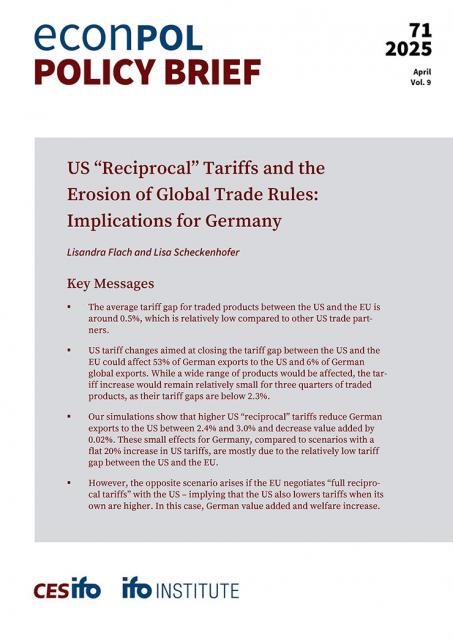News Archive

Globalization and Electoral Outcomes: Evidence from Italy
|
EconPol Working Paper
| News
Did economic factors associated with globalization influence electoral dynamics in Italy over the 1994-2008 period? And if so, to what extent? Using the intensity of import competition from China and the presence of immigrants as their main units of analysis, EconPol research-ers Mauro Caselli, Andrea Fracasso, and Silvio Traverso explore this question. They find that both immigration intensity and exposure to import competition from China contributed posi-tively to the electoral outcomes of far-right parties. But only immigration intensity positively impacted votes for right-wing and traditionalist/authoritarian/nationalist parties. They also find that a higher presence of immigrants lowered electoral turnout.
... Details

How to exit the euro in a nutshell – ‘Il Piano Savona’
|
Opinion
| News
Italy’s new Minister for EU affairs Paolo Savona is the main author of an eight-point plan for Italy’s exit from the euro. In this opinion piece EconPol expert Daniel Gros sheds some light on the Italian government’s strategy. In his view, the Plan seems designed to confirm Germany’s worst fears: exit would be accompanied by a massive default on public debt, including foreign official debt like Target2 balances. But the Plan would also enable rich Italians who have considerable assets abroad to hold onto their euros tax-free.
... Details

Why the IMF and OECD are Wrong about Inequality and Growth
|
EconPol Policy Brief
| News
This EconPol Policy Brief reassesses the relationship between inequality and growth. In their empirical analysis network members Clemens Fuest, Florian Neumeier and Daniel Stöhlker show that there is no robust negative correlation between inequality and growth. For OECD countries, they find that higher inequality coincides with higher, not lower economic growth. The authors also caution against giving the observed correlation between inequality and economic growth a causal interpretation. Both inequality and economic growth are influenced by many policy variables, including education and redistributive taxation. In their view, portraying one of these outcomes as being ‘caused’ by the other is unconvincing.
... Details

Trade Wars in a ‘Winner-takes-all’ Economy
|
EconPol Opinion
| News
What are the implications of Trump’s trade follies with tariffs for the rest of the world? EconPol network member Daniel Gros examines the nature of today’s trade wars by focusing on the high tech sector. He explains why differences in profit opportunities tend to escalate trade conflicts in a ‘winner takes all’ economy. Today, the US government is essentially lining up its diplomatic guns behind its internet giants, while Europe and China are baying for their monopoly profits. This is a zero-sum game, warns Gros, which can only turn negative sum through the collateral damage that it causes to the global trading system.
... Details

The Effects of Immigration in Developed Countries: Insights from Recent Economic Research
|
EconPol Policy Report
| News
How does migration impact the labour market, public finance and the political landscape? In EconPol’s latest policy report network members Anthony Edo, Lionel Ragot, Hillel Rapoport, Sulin Sardoschau and Andreas Steinmayr, CEPII, show that immigration can create winners and losers in the host country’s native workforce by affecting the skill composition of receiving economies and changing wage dispersion. But cultural concerns emerge as the key driver of scepticism towards immigration. A deeper understanding of these concerns is a precondition for designing policies that foster a positive atmosphere and combat negative attitudes towards immigrants and extreme voting.
... Details
